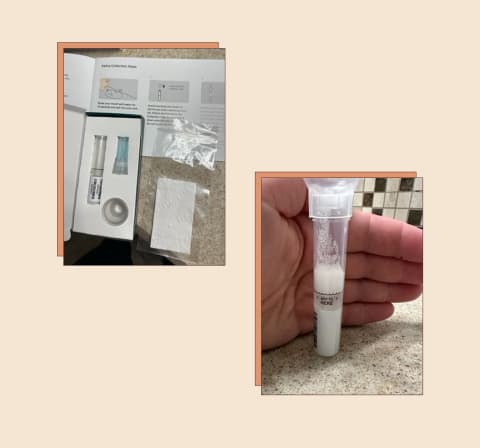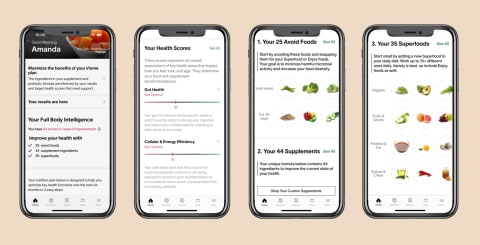These innovative at-home tests help determine which foods (and supplements) are ideal, and which are not so great, all based on our genetics. Below, find my detailed Viome at-home test review. I’ll walk you through my experience, how Viome holds up to its competitors, and share whether my results were easily digestible (pun intended). Alice Williams, a physician and health enthusiast, explains that the gut microbiome is a collection of trillions of bacteria and other microorganisms that live in the digestive tract. “It’s thought to play a role in everything from digestion to immune function to mental health,” she explains. “This community of organisms helps break down food, synthesize nutrients, and protect against infection. The gut microbiome also plays a role in shaping the immune system and regulating metabolism.” As we’ve become increasingly aware of how interconnected the gut microbiome is to memory, mood, cognition1, and overall health2, there’s been a surge in at-home testing. This type of direct-to-consumer lab test allows individuals to bypass a doctor’s visit by having a sample kit mailed directly to their home. Results typically arrive through a secure email or app. As Williams reminds us, at-home testing is not a tool for diagnosing health conditions and should not replace regular visits to your doctor. Williams recommends consulting with your health care provider if you are concerned about symptoms or illness or to discuss abnormal results. It’s also worth noting that Viome also recommends both whole foods and supplements to address any results received from your test—however you should always consul your doctor before starting any new supplement routine. Based on the gene expression activity Viome can see in every individual, which is completely unique to them, Viome can translate these signals into Health Scores that provide the basis for the personalized recommendations, including the aforementioned custom-made supplement formulas. The ultimate goal of Viome is to boost beneficial activity for optimal health and suppress harmful activity within the body. Stool collection. The stool sample process is fairly straightforward: You poop onto a collection paper that you lay across the toilet. There is a spoon included in the kit, which you can use to gather a spoonful of stool and add it to the collection tube. From there, just flush the paper and remaining stool down the toilet and shake your sample to mix it with the liquid in the tube. If you are worried about the cleanliness of a stool sample and er, spillage, I can assure you it’s safely contained. Saliva collection. The next morning, prior to any food or drink, I completed the saliva sample. I thought, “Should be simple enough, just spit a few times into a tube, right?” Turns out, this sample type was actually the most difficult simply because of the amount of saliva needed. It took me at least 30 minutes to fill the tube to the fill line. I was not expecting it to take as long, so heed my advice: Allow yourself sufficient time to complete this step. Blood collection. The third sample type is blood from a finger prick. As a nurse, I’ve performed this procedure multiple times on patients, so it felt pretty natural to do. The kit only comes with two lancets, which, in my opinion, is not enough. I have fairly fast clotting abilities, so I used the two lancets on two different fingers and just barely finished filling the pipettes before I stopped bleeding from my fingertip. Had I clotted any earlier, I would have needed another lancet (which most people don’t have lying around the house). Not only did the test provide me with a variety of health scores—including 42 where I needed improvement—the results also provided me with a supplement recommendation from the brand designed for optimal gut health. They also included a list of 25 foods that I should avoid and 35 “superfoods” or items I should incorporate into my diet more. Essentially, there’s a lot of information to digest, and I truly felt like I would have benefited from having a medical expert walking me through the results and answer any questions. I also struggled slightly with the UX. For example, I thought the food recommendations were vague without any insights as to why they were the right recommendation for me. The brand later informed us that it was possible to actually click into the food to get a brief synopsis—but I only knew this feature was possible when the brand reached out afterwards. Plus, when you do click into the synopsis, many are vague. For example, the brief may mention why you should eat more avocados and allude to different benefits, but there were no links to the exact studies for the benefits mentioned. Regardless, it’s clear from my health scores that I have some work to do to optimize my oral and gut health and overall well-being. The results include 8 high-level Integrative Health scores to determine your food and supplement recommendations for the next 4 to 6 months. The brand advises retesting at that point, to ensure the changes you’ve made are altering your internal health. Any adaptations required can be reformulated with new and updated results. Users will receive a list of food recommendations categorized as “Superfoods,” “Enjoy,” “Minimize,” and “Avoid”. The results also include recommendations for vitamins, food extracts, minerals, amino acids, and herbs. Viome also offers an option to order custom-formulated supplements made specifically for the user based on the results—but you should always check with your healthcare practitioner before starting any new supplement routine. Compared with the Full Body Intelligence Test, the Health Intelligence test includes only five high-level Integrative Health scores instead of eight. However, the results will still outline recommended food and supplements to include and avoid until you test again in 6 months. The Health Intelligence Test informs users on how their current diet and lifestyle are impacting their health and why they might be experiencing certain symptoms. By analyzing blood and stool samples, the test provides a complete guide to your gut microbiome. Your Integrative Functional Health Score for gut health will determine your food and supplement recommendations, focusing on optimizing digestion and food absorption. If someone suffers from gut lining issues, gas production, difficult digestive processes, or lack of food diversity, this is a great test to consider. Requiring only a stool sample, this is the simplest of the Viome test kits. There is no need to fast before collecting your stool, so as soon as your kit arrives and the opportunity presents, you can collect the sample. Unlike its competitors, Viome analyzes mRNA, instead of DNA, to determine the root cause of health issues (early signals), as opposed to simply identifying the symptoms. Messenger RNA (mRNA) is a transcription of someone’s DNA. DNA remains the same throughout your life, which is why food recommendations based on DNA will never change—even if you gain weight or begin to develop a health condition. If your DNA never changes, what changes as you become sick? The answer is your RNA, or “gene expression.” Viome’s tests analyze gene expressions from your microbial and human cells, in order to provide you with insights and food and supplement recommendations that will help bring your body back into balance and keep you healthy. As we look at all our picks for the best gut microbiome tests, Viome is our most-recommended option. However, the other tests offer different features that might be best for certain people. Biome is an option for those who desire a live consultation to review results. For $180, users can connect with someone to ask clarifying questions and gain further insight into what their biomarker readings mean. With Biome, your results reveal a gut health score from 1 to 10. Although straightforward and simple, it may not provide enough detail for some. Biome results can take four to six weeks and only measures two biomarkers, bacteria and fungi, through a stool sample. Retesting after making the recommended changes is imperative to ensure your dietary changes are helping. Floré, another microbiome test, has an option for a monthly $79 subscription, which includes a microbiome test every four months, along with a uniquely formulated supplement shipped to your door. Floré also includes follow-up consultations with a “care scientist” who will review the results after your test. Providing results in one to three weeks and testing for bacteria, fungi, viruses, parasites, and yeast, this all-inclusive option is ideal for someone who wants to test their gut health regularly. The Full Body Intelligence Test is recommended for people who feel any of the above, a lack of energy or brain fog, or who simply wants to improve their immune health, oral health, gut health, skin health, and biological age. Essentially, anyone looking to take control of their health and optimize their body and mind for peak performance should try Viome. I would personally recommend Viome to anyone who is looking to bring their health to an optimal level. Because the follow-up process is lacking, I advise finding a holistic health care provider who can help you decipher your results and work on a plan to optimize your health. In the meantime, try out these three daily gut health habits to incorporate into your daily routine.









